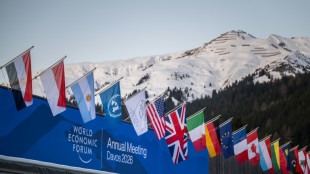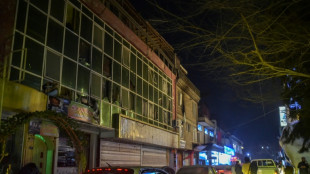
-
 EU leaders take stage in Davos as Trump rocks global order
EU leaders take stage in Davos as Trump rocks global order
-
Blast at Chinese restaurant in Kabul kills 7

-
 Warner hits 'Sinners' and 'One Battle' tipped for Oscar nominations
Warner hits 'Sinners' and 'One Battle' tipped for Oscar nominations
-
Colombian paramilitary-turned-peace-envoy sentenced over atrocities

-
 Gilgeous-Alexander leads Thunder in rout of Cavaliers
Gilgeous-Alexander leads Thunder in rout of Cavaliers
-
Seahawks blow as Charbonnet ruled out for rest of season

-
 Kostoulas stunner rescues Brighton draw after penalty row
Kostoulas stunner rescues Brighton draw after penalty row
-
Man Utd greats tell Martinez to 'grow up' as feud rumbles on

-
 LeBron James' All-Star streak over as starters named
LeBron James' All-Star streak over as starters named
-
Allies tepid on Trump 'peace board' with $1bn permanent member fee

-
 Ninth policeman dies in Guatemala gang riots, attacks
Ninth policeman dies in Guatemala gang riots, attacks
-
Man City's Foden to play through pain of broken hand

-
 Milan Fashion Week showcases precision in uncertain times
Milan Fashion Week showcases precision in uncertain times
-
Public media in Europe under unprecedented strain

-
 Africa Cup of Nations refereeing gets a red card
Africa Cup of Nations refereeing gets a red card
-
Tributes pour in after death of Italian designer Valentino

-
 Bills fire coach McDermott after playoff exit: team
Bills fire coach McDermott after playoff exit: team
-
Chile wildfires rage for third day, entire towns wiped out

-
 Valentino, Italy's fashion king who pursued beauty at every turn, dies at 93
Valentino, Italy's fashion king who pursued beauty at every turn, dies at 93
-
France PM to force budget into law, concedes 'partial failure'

-
 Allies tepid on Trump 'peace board' with $1bln permanent member fee
Allies tepid on Trump 'peace board' with $1bln permanent member fee
-
'My soul is aching,' says Diaz after AFCON penalty miss

-
 Ex-OPEC president in UK court ahead of corruption trial
Ex-OPEC president in UK court ahead of corruption trial
-
Iran warns protesters who joined 'riots' to surrender

-
 Stop 'appeasing' bully Trump, Amnesty chief tells Europe
Stop 'appeasing' bully Trump, Amnesty chief tells Europe
-
Central African Republic top court says Touadera won 78% of vote

-
 Trump tariff threat has global investors running for cover
Trump tariff threat has global investors running for cover
-
Spectacular ice blocks clog up Germany's Elbe river

-
 Trump says not thinking 'purely of peace' in Greenland push
Trump says not thinking 'purely of peace' in Greenland push
-
Syria's Kurds feel disappointed, abandoned by US after Damascus deal

-
 Man City sign Palace defender Guehi
Man City sign Palace defender Guehi
-
Under-fire Frank claims backing of Spurs hierarchy

-
 Prince Harry, Elton John 'violated' by UK media's alleged intrusion
Prince Harry, Elton John 'violated' by UK media's alleged intrusion
-
Syria offensive leaves Turkey's Kurds on edge

-
 Man City announce signing of defender Guehi
Man City announce signing of defender Guehi
-
Ivory Coast faces unusual pile-up of cocoa at export hubs

-
 Senegal 'unsporting' but better in AFCON final, say Morocco media
Senegal 'unsporting' but better in AFCON final, say Morocco media
-
New charges against son of Norway princess

-
 What is Trump's 'Board of Peace'?
What is Trump's 'Board of Peace'?
-
Mbappe calls out Madrid fans after Vinicius jeered

-
 Russians agree to sell sanctioned Serbian oil firm
Russians agree to sell sanctioned Serbian oil firm
-
Final chaos against Senegal leaves huge stain on Morocco's AFCON

-
 Germany brings back electric car subsidies to boost market
Germany brings back electric car subsidies to boost market
-
Europe wants to 'avoid escalation' on Trump tariff threat: Merz

-
 Syrian army deploys in former Kurdish-held areas under ceasefire deal
Syrian army deploys in former Kurdish-held areas under ceasefire deal
-
Louvre closes for the day due to strike

-
 Prince Harry lawyer claims 'systematic' UK newspaper group wrongdoing as trial opens
Prince Harry lawyer claims 'systematic' UK newspaper group wrongdoing as trial opens
-
Centurion Djokovic romps to Melbourne win as Swiatek, Gauff move on

-
 Brignone unsure about Olympics participation ahead of World Cup comeback
Brignone unsure about Olympics participation ahead of World Cup comeback
-
Roger Allers, co-director of "The Lion King", dead at 76


Plane contrails: white fluffy contributors to global warming
The white, feathery lines behind airplanes that look like bits of harmless cloud are anything but, warn experts, who say they could have a greater environmental impact than the aviation sector's CO2 emissions.
The condensation trails -- contrails, for short -- are being increasingly studied as scientists work with the industry to find technological solutions to the problem.
Classified as non-CO2 emissions from aircraft, in September they were the subject of a symposium in Montreal organized by the International Civil Aviation Organization, a UN agency.
- What are contrails? -
Contrails are clouds that form at high altitudes in cold, humid areas called ice supersaturated regions (ISSRs).
When jet fuel is burned by engines, water vapor condenses on to soot particles to form ice crystals.
Enough ice crystals, and they begin to form cirrus clouds -- high-altitude, wispy white filaments that, when created this way, trail out behind planes as they cross the sky.
These trails trap some of the heat that rises from the Earth at night, preventing it from radiating back out of the atmosphere -- thus acting as a greenhouse gas, causing warming, explains Donald Wuebbles, a professor at the University of Illinois.
Contrails that stay in the sky for a few minutes are not very worrisome, he says.
"But if they form at night, they'll maybe last a little longer, and at night they can cause a warming effect," he adds.
- What is the impact? -
Non-CO2 emissions could account for up to two-thirds of aviation's impact on global warming, which "gives you an idea of how important they are to consider," Wuebbles said.
And contrails could form up to 57 percent of that impact -- far more than the C02 emissions from burning fuel, according to a 2021 study.
However, such emissions are short-lived compared to carbon dioxide and their impact on global warming could be quickly eroded if solutions were found to avoid them, experts say.
- So what can be done? -
Not all flights create contrails -- it can depend on weather conditions and the aircraft's trajectory.
For example, at Air France, just four percent of flights are responsible for some 80 percent of the airline's contrail impact on global warming, notes Irene Boyer-Souchet, who is leading up the company's efforts to mitigate the damage.
The long-term strategy is to modify the trajectory of a fraction of flights.
Air France pilots made more than 3,000 observations over 18 months with the aim of helping Meteo-France improve its forecasts for at-risk areas so that pilots could eventually avoid them.
"The main risk is that by thinking you're avoiding an area, you could end up flying there because it's slightly off the weather forecast," Boyer-Souchet points out, illustrating the importance of fine-tuning the research.
Pilots from American Airlines conducted 70 test flights above or below at-risk areas, guided by satellite images, weather data, software models and AI prediction tools.
A 54-percent reduction in contrails was observed, along with a two-percent increase in fuel consumption.
Accelerating the deployment of a global contrail avoidance system could reduce aviation's impact on the climate by 40 percent, according to a Cambridge University report published in September.
The more flights in the air, however, the more complicated the implementation of such a system would be, notes Boyer-Souchet, who hopes that it will be a reality by 2030.
R.Buehler--VB



